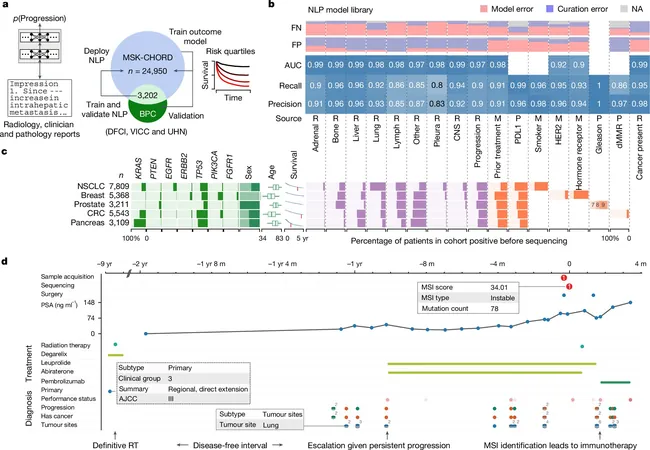
Revolutionary AI Breakthrough Enhances Cancer Outcome Predictions!
2024-11-06
Author: Jacques
Introduction
A groundbreaking study from the esteemed Memorial Sloan Kettering Cancer Center (MSK) has revealed an innovative method that could transform how we predict cancer outcomes. By dismantling traditional data silos in hospitals and leveraging advanced artificial intelligence (AI), researchers are uncovering insights that could save lives.
The MSK-CHORD Dataset
This pioneering research pushes the boundaries of cancer prognosis using the newly developed MSK-CHORD (Clinicogenomic Harmonized Oncologic Real-World Dataset). This real-time, automated system amalgamates a wealth of information, including physicians' free-text clinical notes, treatment outcomes, patient demographics, and tumor genomic data sourced from the MSK-IMPACT platform. The dataset represents the largest collection of its kind, involving nearly 25,000 patients suffering from non-small cell lung, breast, colorectal, prostate, and pancreatic cancers.
Research Findings
Under the leadership of co-first authors Dr. Justin Jee, Dr. Christopher Fong, Dr. Karl Pichotta, Dr. Thinh Ngoc Tran, and Dr. Anisha Luthra, and with oversight from Dr. Nikolaus Schultz, the team’s findings were published in the prestigious journal Nature. The results indicate that MSK-CHORD significantly surpasses traditional methods that rely on genomic data or cancer stage alone for predicting patient outcomes.
Key Discoveries
By analyzing a staggering 700,000 radiology reports, the research team identified intricate predictors of metastasis specific to various organ sites. Furthermore, the extensive size and rich annotations of MSK-CHORD led to the identification of mutations in the SETD2 gene—an uncommon but promising biomarker indicating potential responsiveness to immunotherapy in lung adenocarcinoma. This critical finding was confirmed through multiple independent datasets, emphasizing the robustness of their conclusions.
Expert Insights
Dr. Jee, a thoracic medical oncologist at MSK, expressed optimism over the findings, stating, 'Our results highlight the power of natural language processing and the impact of bringing together a multitude of data streams to better predict patient outcomes.' His sentiments were echoed by Dr. Schultz, who hopes this study will spur further research into the intricate connections between genomic data and real-world cancer outcomes.
Conclusion
As researchers continue to unveil the complexities of cancer treatment, this cutting-edge approach exemplifies how innovative technology can be harnessed to improve patient care and possibly revolutionize cancer treatment protocols for the better. Stay tuned for more groundbreaking updates in cancer research!









 Brasil (PT)
Brasil (PT)
 Canada (EN)
Canada (EN)
 Chile (ES)
Chile (ES)
 España (ES)
España (ES)
 France (FR)
France (FR)
 Hong Kong (EN)
Hong Kong (EN)
 Italia (IT)
Italia (IT)
 日本 (JA)
日本 (JA)
 Magyarország (HU)
Magyarország (HU)
 Norge (NO)
Norge (NO)
 Polska (PL)
Polska (PL)
 Schweiz (DE)
Schweiz (DE)
 Singapore (EN)
Singapore (EN)
 Sverige (SV)
Sverige (SV)
 Suomi (FI)
Suomi (FI)
 Türkiye (TR)
Türkiye (TR)